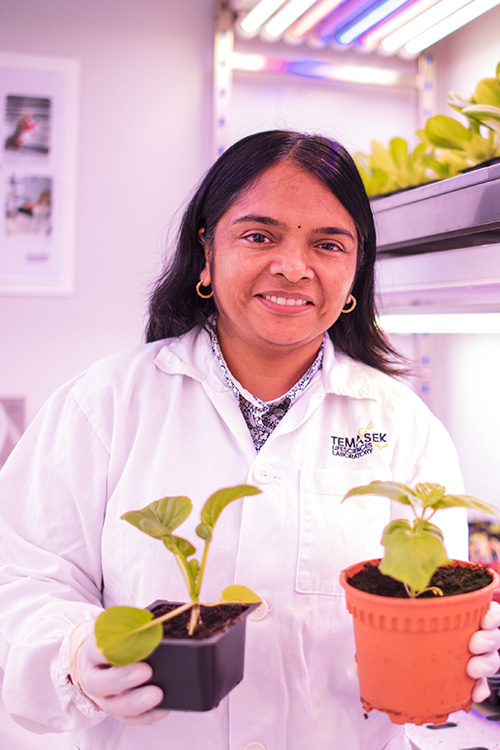
Impact
Booming population and climate change pose considerable threats to food security. To keep up with growing demands and challenging supplies, new technologies that promote sustainable precision agriculture need to be developed. An area of focus is plant stress, a leading cause of agriculture yield loss. An understanding of how volatile organic compounds (VOCs) are produced in plants will lead to enhanced stress responses and new sensor tools to monitor plant health.
Collaborations, Achievements & Honours
- Demonstrated that Raman spectroscopy and salicylic acid nano sensor can detect black rot disease in brassica vegetables at an asymptomatic stage
- Identified the benefits of VOC mediated communication in plants and its use in vegetable to increase biomass when grown along suitable companion plants
- Identified key genes which serve as potential targets for genome editing plants with increased biomass and disease resistance
- Research Collaboration with MIT on developing optical and nano sensors for early disease diagnosis in plants
- Research Collaboration with NUS on developing sensors based on volatile organic compounds for disease diagnosis in plants
- Granted research by A*STAR on High Performance Precision Agriculture System (2020)
- Granted research by the Singapore-MIT Alliance for Research and Technology (SMART) Centre and the Singapore National Research Foundation on Disruptive Sustainable Technologies for Agriculture Precision (DiSTAP) and Synthetic Cannabinoid Biology: Repurposing Nature for Tomorrow’s Therapeutics (2018)
- Granted research by the Singapore National Research Foundation on Synthetic Biology (2017)
Research Areas
Agronomy, Synthetic Biology, Genetics & Genomics
Affiliations
- Senior Principal Investigator, TLL
Question
How do plants develop secretory structures, which are used to produce commercially important VOC chemicals and how plants use VOCs to talk to each other?
Approach
Plants produce an overwhelming variety of volatile organic compounds (VOCs) which are of great economic importance as they are widely used in flavours, fragrances, cosmetics and pharmaceuticals.. Plant generally produce and store VOCs in specialized secretory structures called glandular trichomes and genes involved in their development remain largely unknown. The lab is currently studying the aromatic plant Mentha to identify genes that are responsible for glandular trichome development. Aromatic mint plants of Mentha species are easy to cultivate and harvest. They are also the source of Menthol, the principal component of peppermint essential oil that is widely used in confectionary goods and daily products.
VOCs plays an important role in biotic and abiotic stress responses of plants. Stress alters VOCs emissions from plants. Changes in VOC emissions were profiled in leafy vegetables that were infected with pathogens and the data is being used to develop sensors for disease diagnosis. Exploring ways to metabolically engineer VOCs production in plants Rajani’s lab is utilising these eco-friendly compounds to improve crops defence responses and yield. They have successfully elucidated genetic pathways involved in biosynthesis, and identified methods to enhance stress responses by altering VOC emission
Plants in natural environments co-exist in a community and can have different types of neighbours. VOCs serves as the chemical language that plants use to communicate with each other. Studies are being done to analyse the effect of neighbouring plant VOCs on the growth and defence responses of vegetable crops. Elucidating VOC mediated communication among plants and how it is used by the receiver plants to adjust their growth, defence mechanisms, and overall fitness will promote sustainable agriculture by decreasing the dependency on agrochemicals.
Previously, Rajani’s lab discovered a gene that prevents fruits from opening their pods too soon. This has since been applied to a few commercial varieties to prevent seeds from spilling onto the ground. Recognising the urgency to get new germplasm, seed varieties and hybrids tailor-made to suit different countries’ climate conditions, the lab is currently working on genome editing to develop climate resilient crop varieties
Bio
Rajani read her PhD with Prof Venkatesan Sundaresean at the Singapore Institute of Molecular Agrobiology in 2002, whom she worked with on fruit dehiscence in Arabidopsis. After completing postdoctoral training on plant cell polarity establishment with John Bowman at the University of California, Davis, she joined the agrobiotech research division of DuPont company as Research scientist . Thereafter, Rajani joined TLL as a Strategic Research Programme manager. She is currently Senior Principal Investigator at TLL.
Senior Principal Investigator
Sarojam Rajani
The lab focuses on understanding the production of volatile organic compounds (VOCs) and its role in mitigating plant stress to promote sustainable agriculture.
Group Publications
-
A theory of mechanical stress-induced H2O2 signaling waveforms in Planta
Thomas K. Porter, Michael N. Heinz, Daniel James Lundberg, Allan M. Brooks, Tedrick Thomas Salim Lew, Kevin S. Silmore, Volodymyr B. Koman, Mervin Chun-Yi Ang, Duc Thinh Khong, Gajendra Pratap Singh, James W. Swan, Rajani Sarojam, Nam-Hai Chua & Michael S. Strano.7 December 2022 -
Comparative Transcriptome Analysis Reveals Coordinated Transcriptional Regulation of Central and Secondary Metabolism in the Trichomes of Cannabis Cultivars
Yeo HC, Reddy VA, Mun BG, Leong SH, Dhandapani S, Rajani S, Jang IC.27 July 2022

